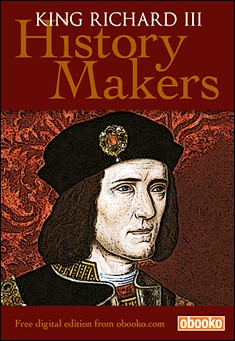King Richard the Third, known commonly in history as Richard the Usurper, was perhaps as bad a man as the principle of hereditary sovereignty ever raised to the throne, or perhaps it should rather be said, as the principle of hereditary sovereignty ever _made_. There is no evidence that his natural disposition was marked with any peculiar depravity. He was made reckless, unscrupulous, and cruel by the influences which surrounded him, and the circumstances in which he lived, and by being habituated to believe, from his earliest childhood, that the family to which he belonged were born to live in luxury and splendor, and to reign, while the millions that formed the great mass of the community were created only to toil and to obey. The manner in which the principles of pride, ambition, and desperate love of power, which were instilled into his mind in his earliest years, brought forth in the end their legitimate fruits, is clearly seen by the following narrative.
Excerpt:
When the affairs of the kingdom were settled, after the return of King Edward to the throne, Richard, Duke of Gloucester, the subject of the present volume, was found occupying a very exalted and brilliant position. It is true, he was yet very young, being only about nineteen years of age, and by birth he was second to Clarence, Clarence being his older brother. But Clarence had been so wavering and vacillating, having changed sides so often in the great quarrels, that no confidence was placed in him now on either side. Richard, on the other hand, had steadily adhered to his brother Edward’s cause. He had shared all his brother’s reverses, and he had rendered him most valuable and efficient aid in all the battles which he had fought, and had contributed essentially to his success in all the victories which he had gained. Of course, now, Edward and his friends had great confidence in Richard, while Clarence was looked upon with suspicion and distrust.
Clarence, it is true, had one excuse for his instability, which Richard had not; for Clarence, having married the Earl of Warwick’s daughter, was, of course, brought into very close connection with the earl, and was subjected greatly to his influence. Accordingly, whatever course Warwick decided to take, it was extremely difficult for Clarence to avoid joining him in it; and when at length Warwick arranged the marriage of his daughter Anne with the Prince of Wales, King Henry’s son, and so joined himself to the Lancaster party, Clarence was placed between two strong and contrary attractions—his attachment to his brother, and his natural interest in the advancement of his own family being on one side, and his love for his wife, and the great influence and ascendency exerted over his mind by his father-in-law being on the other.
Richard was in no such strait. There was nothing to entice him away from his fidelity to his brother, so he remained true.
He had been so brave and efficient, too, in the military operations connected with Edward’s recovery of the throne, that he had acquired great renown as a soldier throughout the kingdom. The fame of his exploits was the more brilliant on account of his youth. It was considered remarkable that a young man not yet out of his teens should show so much skill, and act with so much resolution and energy in times so trying, and the country resounded with his praises.
As soon as Edward was established on the throne, he raised Richard to what was in those days, perhaps, the highest office under the crown, that of Lord High Admiral of England. This was the office which the Earl of Warwick had held, and to which a great portion of the power and influence which he exercised was owing. The Lord High Admiral had command of the navy, and of the principal ports on both sides of the English Channel, so long as any ports on the French side remained in English hands. The reader will recollect, perhaps, that while Richard was quite a small boy, his mother was compelled to fly with him and his little brother George to France, to escape from the enemies of the family, at the time of his father’s death, and that it was through the Earl of Warwick’s co-operation that she was enabled to accomplish this flight. Now it was in consequence of Warwick’s being at that time Lord High Admiral of England, and his having command of Calais, and the waters between Calais and England, that he could make arrangements to assist Lady Cecily so effectually on that occasion.









